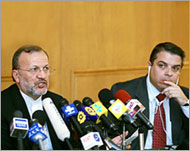Netanyahu threatens Iran N-plants
Former Israeli prime minister Benyamin Netanyahu has told Israeli state-run radio he will take action against Iran’s nuclear plants if he is elected the next prime minister.

“The Iranian threat is an existential one. In this regard, I will continue the legacy of (former Israeli prime minister) Menachem Begin, who thwarted Iran’s neighbour, Iraq, from acquiring nuclear weapons by adopting bold and daring measures.
“I believe that is what Israel needs to do,” Netanyahu said on Sunday.
The frontrunner to lead Israel’s right-wing Likud Party evoked the memory of Begin, who in 1981 ordered the Israeli air force to destroy Iraq’s nuclear plant at Osirak.
In the same interview, Netanyahu said he believed that every thing ought to be done to prevent what he called Iran’s “nuclear armament”.
“This is the Israeli government’s primary obligation. If it is not done by the current government, I plan to lead the next government to do it.”
Prime Minister Ariel Sharon quit the Likud to form his own political party in the run-up to March 28 elections.
Iranian vow
Iran, the world’s fourth-biggest oil producer, has stated that its nuclear programme is for energy needs only. It has vowed to retaliate against any attack.
Netanyahu made no mention of Israel’s own large nuclear arsenal, which according to most strategic experts includes as many as 280 nuclear bombs, with delivery systems, including the Yariho intercontinental missile.
|
“I will continue the legacy of (former Israeli Prime Minister) Menachem Begin who thwarted Iran’s neighbour, Iraq, from acquiring nuclear weapons by adopting bold and daring measures” Benyamin Netanyahu, |
The Israeli government, while distancing itself from Netanyahu’s remarks, lashed out at the Islamic republic.
An Israeli Foreign Ministry spokesman, Mark Regev, said Israel was not planning unilateral action against Iran.
However, he suggested that Israel might be forced to change its policy if the international community failed to “stop the Iranians”.
“The Iranian regime is very extremist. It doesn’t possess the kind of rationality that prevailed during the cold war between the West and the Soviet Union.
Gimmicks
Shlomo Avneri, head of the Hebrew University’s political science department, termed Netanyahu’s remarks “electioneering gimmicks.”
“I think we should view these remarks in the context of two things, first the present election campaign, and second, the all-clear fact that Netanyahu is not going to win,” he told Aljazeera.net.
 |
|
Iranian officials have denied |
Asked whether Netanyahu’s remarks would pressure Sharon to attack Iran, Avneri said he did not think so.
Independent analysts, however, think Israel, perhaps with US support, could mount a similar strike against Iran, though its facilities are numerous, dispersed and well-defended.
Avneri said it was unlikely that Israel would spearhead the “international campaign against the Iranians”.
Avneri suggested that Israeli leaders were frustrated by the failure of the American bullying approach and the European negotiating approach to Iran’s nuclear ambitions.
Sharon recently said that Israel could not accept the emergence of a nuclear-armed Iran, but steered clear of threatening military action.
Record
Netanyahu’s actions have drawn criticism in the past.
In 1997, he ordered the assassination of Khalid Mashal, the head of Hamas politburo, who was based in the Jordanian capital, Amman.
|
“I think we should view these remarks in the context of two things, first the present election campaign, and second, the all-clear fact that Netanyahu is not going to win” Shlomo Avneri, |
The failed poisoning sparked a political crisis with Jordan, and King Hussein reportedly threatened to sever relations with Israel if it did not provide the antidote that would save Mashal’s life.
Israel eventually gave Jordan the antidote and agreed to release Hamas leader and founder Shaikh Ahmad Yassin from prison.
In 1996, Netanyahu triggered a crisis with the Palestinians when he ordered the opening of a tunnel beneath Jerusalem’s al-Aqsa Mosque, considered the third-holiest site in Islam.
The measure led to bloody clashes between the Israeli army and the Palestinian Authority police.